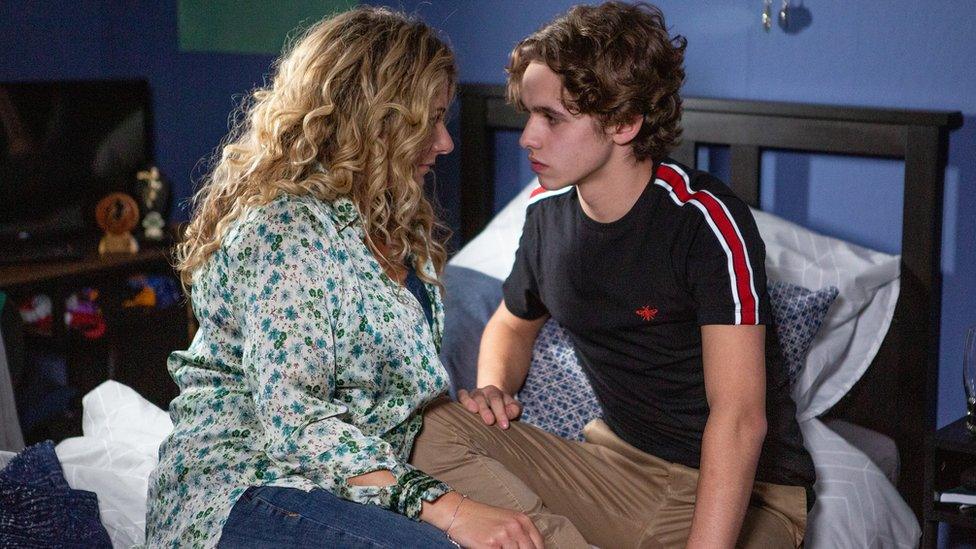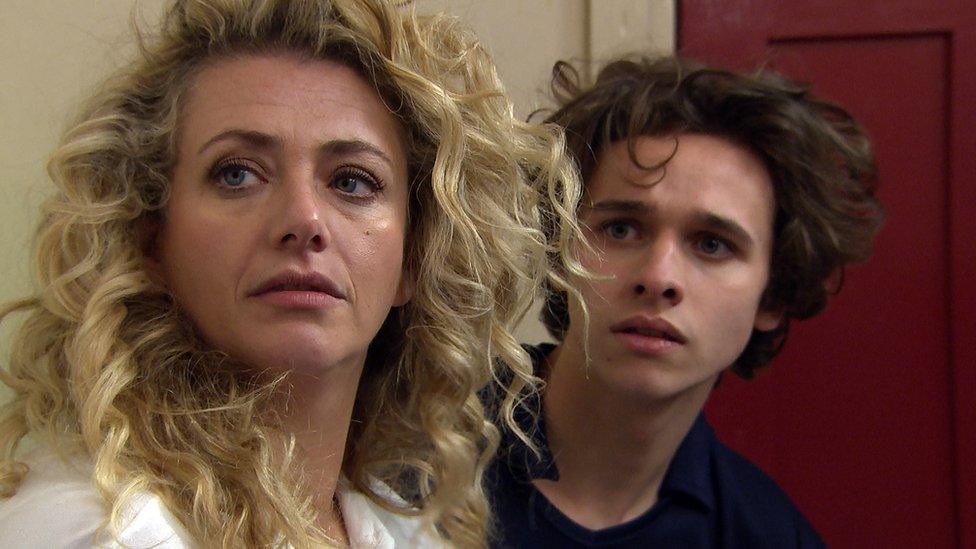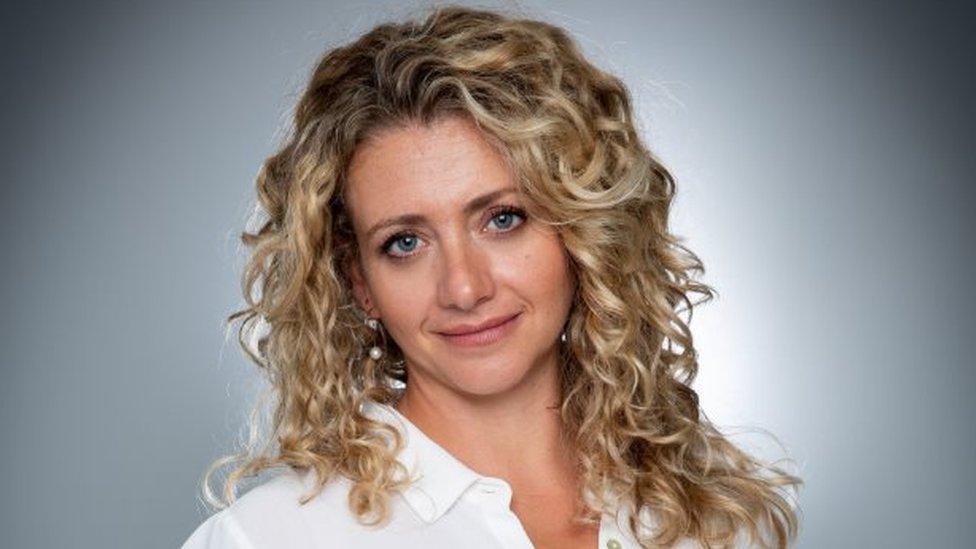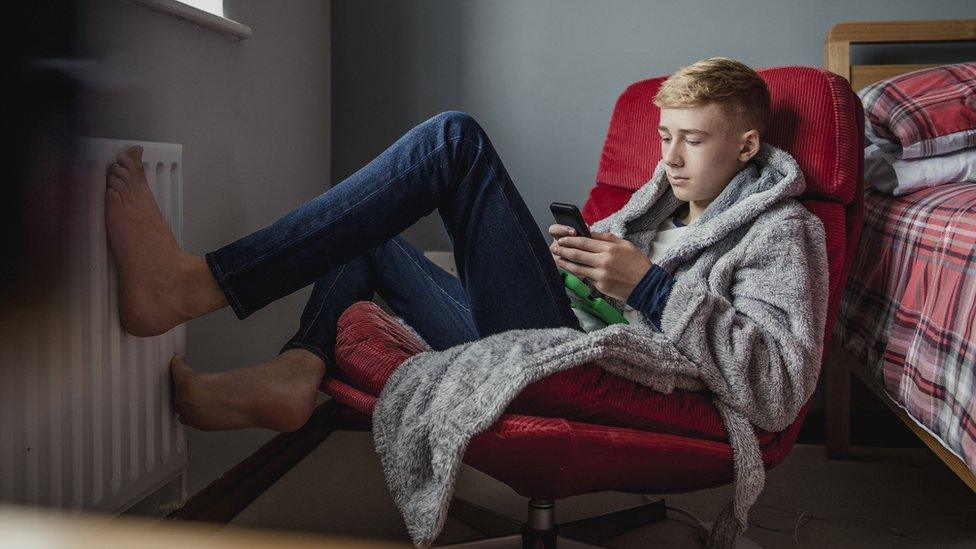Emmerdale: The myths around male sexual grooming explained
- Published

Emmerdale is known for tackling difficult subjects and its latest storyline has left many viewers feeling horrified and repulsed.
Over the last few weeks, teacher Maya Stepney has started a sexual relationship with her 16-year-old pupil Jacob.
Producers have been working closely with Barnardo's to help the cast and crew get things right.
But the children's charity says there's a "worrying lack of knowledge" about the law around grooming.
In Emmerdale, Maya and Jacob had sex a few days after his 16th birthday - which is illegal because she is in a position of trust as his teacher.
But a poll by the charity found nearly one in five people failed to realise this was a crime.
Amanda Naylor, head of child sexual abuse at the charity, says the society's perception of grooming can be different depending on the gender of the victim.
Here she busts some of the public attitudes and questions around male grooming:
Grooming isn't as serious for boys compared to girls

Maya is Jacob's teacher and was also in a relationship with his stepdad David Metcalfe
"The result of our survey confirmed what we've found when we've talked to the general public - it's often around gender differences.
"If it's a male teacher and a female student then people are more likely to feel it's illegal, immoral or inappropriate. If it's a female teacher and male student they're less likely to think that.
"What it shows is society's perception around what boys are like, what they want out of life and they're hyper-sexualised. But equally they're not vulnerable.
"Our experience of working with young men is that they're equally as vulnerable as young women to exploitation and abuse. The impact of what happens afterwards when they realise they've been groomed and exploited is as serious.
"They just show the impact in different ways. Many boys will get angry and hurt and unable to have positive and consensual relationships later in life and might be using substances or alcohol as a way of coping.
"Yet society feels like actually for boys it's not a big deal."
The age of consent is 16. So why is it illegal for Jacob to have sex with Maya?

Maya, played by Louisa Clein, was arrested in Tuesday's episode
"The Sexual Offences Act of 2003 says that if you're in a position of trust it's illegal for you to engage in any sexual activity, or show pictures of sexual activity or have sexual activity in front of someone you're in a position of trust with.
"Maya is Jacob's teacher and that makes it an illegal act. You cannot have a sexual relationship with someone who's in a position of trust until you're 18.
"The reason the law is being set at that is that we recognise that young people are still in a development phase. If they had a sexual relationship with a peer where there's equal power and they're both at the same development stage, that's much less harmful than an adult who is coercing and manipulating and calling the shots and using power.
"That's why its an illegal offence for an adult to have any kind of sexual activity with a young person who is 16 or 17."
What if it's just kissing or sexting?

It's illegal for an adult to sext a 16 or 17 year old if they're in a position of trust
"The law covers any sexual activity. This does include kissing, it does include photos and would include watching pornography together and would also include if that teacher was having sex with someone else and Jacob was present.
"All of those things are illegal if that person is in a position of trust."
What's a position of trust?

The law covers lots of different jobs
"This applies to lots of different professions that are employed to work directly with children and young people and there's an associated level of power.
"It could be police officers, it could be teachers, it could be those working in the charity sector, social workers, youth workers - so those adults that are likely to be coming across vulnerable young people.
"In Emmerdale, Jacob is vulnerable. He's had lots of things happen in his life that have led him to be more susceptible to manipulation than other young men in his position.
"Often these professionals are in a position where the young person is relying on them to support them for their mental health or wellbeing, to get them through school or college or the criminal justice system.
"It's absolutely inappropriate for an adult to abuse those boundaries and trust to engage in any kind of sexual activity with a young person."
Would it be different if she wasn't his teacher?

Coercive control became a crime in 2015
"This is where it gets more difficult because it's not necessarily illegal if it's an older woman if they're not in a position of trust. It depends on the kind of behaviours that the older woman might be exhibiting because there are laws around coercion.
"So if you think someone is using power in a way that's controlling a young man or young woman that is coercive - that might be using power or threats or bribery or manipulation - all those things make young people do things they wouldn't normally do, that's an actual offence in terms of domestic abuse legislation.
"People need to be aware of their behaviours in relationships and they're not using that additional power that age gives you in a negative way that has negative consequences for a young person."
What are the tell-tale signs that someone is being groomed?

In Emmerdale, Jacob gets anxious and moody when Maya is treating him badly
"Emmerdale has based their storyline on some of the actual experiences of the boys that have used our services. There's no set list but there are some common patterns and behaviours we see.
More secretive behaviour - this might mean not being as open as leaving their phone or laptop around
Mood changes - we've seen Jacob being high when things are going well and when she's not being as nice he's been quite low
"These are behaviours which can happen for a whole range of reasons. What we say to families who are seeing some of these things is have a conversation and tell them they can talk to you about anything and that you're not going to judge or get angry but you're just concerned.
"Having a conversation regularly gives them the opportunity to say 'This happened to me'."
If you have been affected by any of the issues raised, support and advice is available via BBC Action Line.


Follow Newsbeat on Instagram, external, Facebook, external, Twitter, external and YouTube, external.
Listen to Newsbeat live at 12:45 and 17:45 weekdays - or listen back here
- Published30 November 2018

- Published1 March 2019

- Published23 April 2019

- Published26 November 2018

- Published21 January 2019
